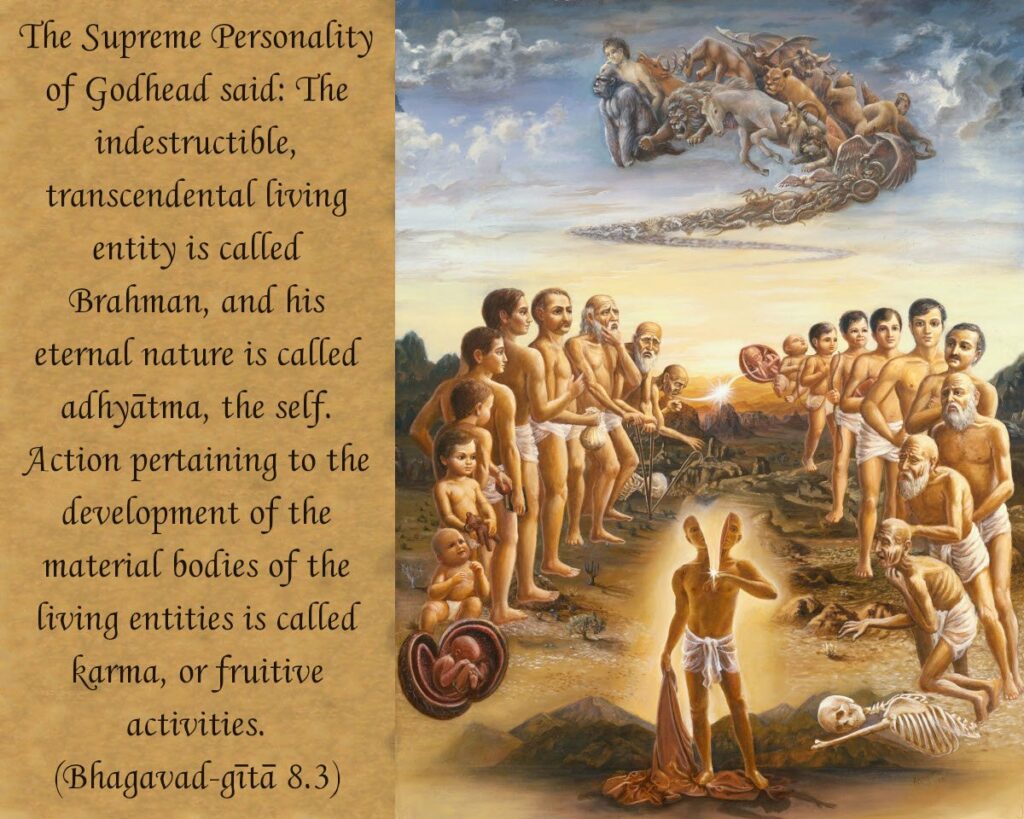श्रीभगवानुवाच |
अक्षरं ब्रह्म परमं स्वभावोऽध्यात्ममुच्यते |
भूतभावोद्भवकरो विसर्ग: कर्मसञ्ज्ञित: || 3||
śhrī bhagavān uvācha
akṣharaṁ brahma paramaṁ svabhāvo ’dhyātmam uchyate
bhūta-bhāvodbhava-karo visargaḥ karma-sanjñitaḥ
śhrī-bhagavān uvācha—the Lord said; akṣharam—indestructible; brahma—Brahman; paramam—the Supreme; svabhāvaḥ—nature; adhyātmam—one’s own self; uchyate—is called; bhūta-bhāva-udbhava-karaḥ—actions pertaining to the material personality of living beings, and its development; visargaḥ—creation; karma—fruitive activities; sanjñitaḥ—are called
Translation:
The Lord said: Brahman is supreme, imperishable. Its essential nature is called Adhyatma (Self-knowledge); the act of sacrifice that causes the birth of beings is named karma (action).
Commentary:
Three questions are answered in this verse. First, what is Brahman? The Supreme and the imperishable is Brahman. Two attributes are mentioned here – supreme (Paramam) and imperishable (Aksharam). There is nothing other than or superior to Brahman. The One above and beyond which there is nothing else is Brahman. That is why it is described to be supreme Paramam. Brahman is imperishable, deathless. Since it is deathless it cannot be said to be born. The whole universe is constantly changing and going through the process of creation and dissolution in an endless chain. Birth and death is the law of nature, and there is only One that is birthless and deathless and that is Brahman. It is the seer (Drik), and so is indestructible. Destruction is only spoken of the seen (Drisya), and not of the seer (Drik). Brahman is indivisible, unaffected by time, space and causation.
To the second question – ‘What is Adhyatma?‘- the answer given is nature (svabhava). One’s nature is svabhava (i.e.) the real Self of man, distinct from the superimposed body, mind, and senses. Out of ignorance, man thinks that he is the body and the mind, and that is his reall nature. It is an error. When knowledge dawns, one knows that he is the Self, Atma, uncontaminated by the body, mind, and the senses. So long as man identifies himself with the elements, which are subject to change and death, he cannot be happy. True happiness is only in the Self, pure, perfect, and imperishable.
The third question is ‘What is Karma?’ The answer is ‘an act of sacrifice’, which is the cause of the birth of beings. This is yajna. By yajna, rains are produced and from rains, food, and from food all beings are born. The word ‘Visarga‘ here means that which is given away or that which is offered as a sacrifice to the Gods in the sacred Fire of the Yajna. In charity (Dana), wealth is sacrificed. Service to mankind in any form is an act of sacrifice. This also is Yajna, and it leads to Moksha.
Question: What is Brahman?
Answer: The indestructible and the supreme Being is Brahman.
Question: What is Adhyatma?
Answer: The true Self of man.
Question: What is Karma?
Answer: That act of sacrifice which causes the emanation of beings is Karma.
Bhagavad Gita: Chapter 8 🔻 (28 Verses)
